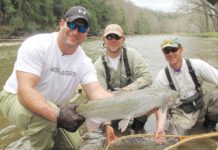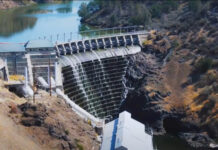Welcome to the latest installment of the Wednesday Wake-Up Call, a roundup of the most pressing conservation issues important to anglers. Working with our friends at Trout Unlimited, Backcountry Hunters & Anglers, the Theodore Roosevelt Conservation Partnership, The Everglades Foundation, Captains for Clean Water, Bullsugar.org, and Conservation Hawks (among others), we’ll make sure you’ve got the information you need to understand the issues and form solid opinions.
If you know of an important issue–whether it’s national or local–that anglers should be paying attention to, comment below, and we’ll check it out!
1. Austin Williams of TU-Alaska Discusses Pebble Mine + an Exciting Job Listing
Austin Williams, Trout Unlimited’s Alaska Director of Law and Policy, appeared on The American Shoreline podcast this week. Austin has worked extensively on the campaign to stave off the Pebble Mine, which was denied its permit by the U.S. Army Corps of Engineers back in November. The discussion focuses on strategy, tactics, and how Bristol Bay might be permanently protected in the future. Click the arrow above to listen, or visit The American Shoreline podcast page.
In related news, if you’d like to play a role in creating permanent protections for the incredible fish habitat of the Last Frontier, TU-Alaska is looking for a new Communications & Public Engagement Director “to lead efforts to protect and conserve clean water and fish habitat across the state, including Bristol Bay.” This is a killer opportunity for a communications professional who wants to be on the front lines of important conservation issues, plus you’d get to live amidst the natural wonders of Alaska.
Click here to learn more and apply for the job
2. How Does Everglades Restoration Fight Climate Change?

Photo by Joel Ruby
Dr. Steve Davis of The Everglades Foundation excels at making complicated scientific ideas understandable for English majors like me, which is why he’s Vice President of Communications & Engagement / Senior Ecologist for the organization. In a great article on the foundation’s website, he explains how wetlands sequester carbon, storing it in the rich soils and vast roots systems. As the Everglades dries out and mangrove forests recede because the flow of fresh water from the north has been interrupted, that carbon can be released into the atmosphere.
Drainage or excessive drying of these soils allows oxygen to move in, breaking down organic matter faster than it can be produced by plants, and releasing carbon dioxide to the atmosphere. In fact, several billion metric tons of carbon dioxide have been added to our atmosphere from this process in the Everglades. For instance, the Everglades Agricultural Area alone has lost 880 million metric tons of carbon dioxide over the last 120 years. Nitrogen and phosphorus also come out of the soil as water “pollutants.” A long-term consequence of this is that the land sinks. Some areas of the Everglades Agricultural Area have sunk more than nine feet over the past century due to drainage and the oxidation of organic matter from those ancient Everglades soils. If too dry, peat soils are also vulnerable to fire, resulting in an immediate release of carbon dioxide, nitrogen, and phosphorus.
Click here for the full story.
3. Conservationists, Anglers, and Hunters Push for Legislative Solutions to Habitat Issues
With a new administration in Washington, there’s a new focus on the government’s role in big conservation issues. Here are three examples over the past week.

President Biden’s Order to Protect 30 Percent of the Nation’s Land Could Be a Massive Win for Fish and Wildlife—If Hunters, Anglers, Farmers, Tribes Have a Say
Writing in Outdoor Life magazine, Christine Peterson argues that, even in a hyper-partisan world, it’s possible that the goals of diverse groups can align, when it comes to habitat:
“From the greenest environmental group to the most camo sportsman’s group, people would agree the condition of habitat in this country has been degraded significantly in the past half century,” says Collin O’Mara, CEO of the National Wildlife Federation. “There’s a huge unifying force between restoration and healthy wildlife and fisheries. It’s about keeping that as a North Star.”
Click here for the full story in Outdoor Life
***
Leading Nonprofits and Associations Call on Congress to Pass Legislation that Puts Americans Back to Work Through Conservation
Faced with large conservation projects and high unemployment, this may be the time to resurrect a version of the Civilian Conservation Corps of the 1930s:
The Theodore Roosevelt Conservation Partnership, National Audubon Society, Environmental Defense Fund, National Wildlife Federation, Ducks Unlimited, National Marine Manufacturers Association, American Sportfishing Association, and others joined forces in identifying a list of shared legislative priorities with House and Senate leadership. The goals of the coalition include building resilient communities that can withstand the impacts of a changing climate, restoring and preserving outdoor spaces, investing in nature-based solutions, and sustainably managing water resources.
Click here for the full story on the TRCP website
***
Biden must quickly reinstate protections for ‘America’s salmon forest’
During the final months of the previous administration, against the policy and wishes of the Forest Service, the protections created 20 years ago for more than 9.3 million acres of Alaska’s Tongass National Forest were revoked. Writing in The Seattle Times, Mike Dombeck (former chief of the U.S. Forest Service) and Chris Wood (president and CEO of Trout Unlimited) argue that a return to the popular Roadless Rule is imperative:
The roadless rule was developed after 600 public meetings and 1.6 million comments. Ninety percent of them favored protecting roadless areas. Most recently on the Tongass, 96% of the public comments, including most Alaskans, supported keeping roadless areas intact. U.S. Sen. Maria Cantwell, D-Wash., and others have introduced legislation that would make permanent the protection of our backcountry roadless areas. America isn’t making any more land. We should protect the best of what we have left of our last remaining wild places.
Click here for the full story in The Seattle Times
Credit: Source link































